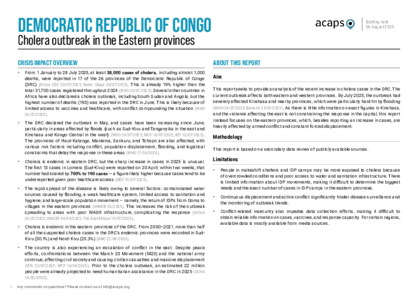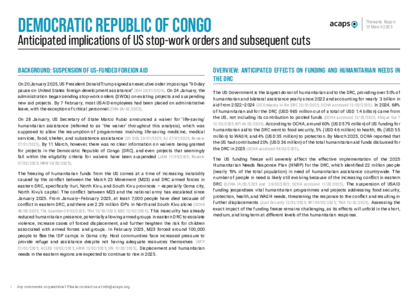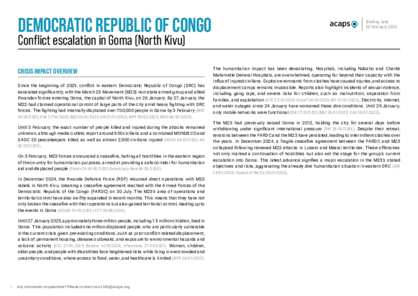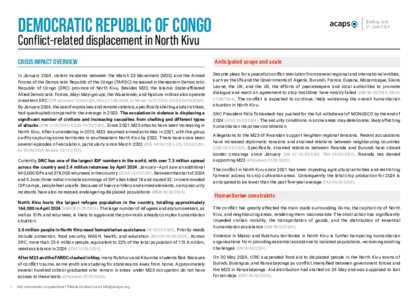Latest updates on country situation
23 February 2026
By 23 February 2026, intense fighting in the Minembwe highlands (Sud-Kivu) had displaced over 200,000 civilians since early February. Most have fled to Fizi territory, facing limited access to basic assistance. Clashes have destroyed homes and led to the closure of health facilities, schools, and markets. (RFI 23/02/2026, CT 20/02/2026)
05 January 2026
Democratic Republic of Congo (DRC) forces and the March 23 Movement have been engaged in intensified armed clashes around Uvira town (Sud-Kivu) since early December 2025, triggering large-scale displacement into Burundi. By 28 December, 101,000 individuals from eastern DRC had arrived through the Buganda, Gatumba, and Rumonge border points. Crossings have continued into January 2026, sustaining pressure on reception and transit capacities. The influx is heightening public health, nutrition, and protection concerns in Burundi. Rising food insecurity and limited WASH access are increasing malnutrition and disease risks, particularly among children. Protection incidents include cases of unaccompanied and separated children and heightened exposure to gender-based violence, exploitation, and abuse. Amid a cholera outbreak, insufficient diagnostic capacity, limited inpatient facilities, and weak referral systems are aggravating morbidity and mortality. Humanitarian priorities include improving mobile health and nutrition services, disease surveillance, WASH infrastructure, and decongestion measures at entry and transit sites. (RFI 04/01/2026, RFI 01/01/2026, (Govt. Burundi/UNHCR 28/12/2025, UNICEF 05/01/2025)
09 December 2025
Renewed violence in Sud-Kivu has displaced over 200,000 people from Kamanyola, Katogota, and Luvungi localities since 2 December 2025. Clashes between the Congolese army, Wazalendo militias, and the March 23 Movement have killed at least 70 people and injured 80. Displaced families are staying in overcrowded shelters, with limited healthcare access amid a nurses’ strike and heightened risks of gender-based violence and disease outbreaks, including cholera and measles. The fighting persists despite a peace agreement between Rwanda and the Democratic Republic of Congo signed on 4 December, spilling over to Burundi, where 3,000 people are facing overcrowded and fragile conditions at the Cishemere transit centre in Cibitoke province – well beyond its capacity. Violence is disrupting education, with nearly 1,300 schools in Sud-Kivu nonfunctional and learning disrupted for over 390,000 children by 4 December. Armed presence near schools, infrastructure attacks, and unexploded ordnance further threaten children’s safety. (OCHA 09/12/2025, OCHA 08/12/2025, Education Cluster 08/12/2025)
04 November 2025
Armed conflict persists in Nord-Kivu province despite renewed peace efforts, with clashes between the March 23 Movement (M23), the Congolese army (FARDC), and allied Wazalendo militias intensifying territorial competition. In September 2025, fighting continued across Masisi, Rutshuru, and Walikale territories, causing further displacement. More than 1,300 protection incidents were reported that month – including killings, abductions, and sexual violence – mirroring the high levels recorded in August and highlighting sustained protection risks for civilians. By October, Nord-Kivu was hosting over 1,152,000 IDPs, a slight decrease from August partly linked to population movements following M23’s advances into Goma and surrounding areas earlier in the year, which initially triggered large-scale displacement but later saw many people returning to their areas of origin. Displaced populations continue to face severe needs amid limited humanitarian response capacity. (Protection Cluster 20/10/2025, Critical Threats 29/10/2025, IOM 21/10/2025)
06 October 2025
Worsening health conditions are compounding humanitarian needs in the Democratic Republic of Congo. There is an active cholera outbreak across 17 provinces, with over 41,000 suspected cases and nearly 1,500 deaths since January 2025. After a confirmed death, the Ministry of Health also declared an Ebola outbreak in Kasaï Central on 3 October. Mpox cases also continue to rise, with more than 3,000 suspected cases this year. Displacement, poor WASH infrastructure, and limited access to healthcare are accelerating the spread of disease. (WHO 03/10/2025, Mercy Corps 02/10/2025, WFP 26/09/2025)
08 September 2025
Health authorities have declared a new Ebola virus disease outbreak in Kasaï province, with 28 suspected cases and 16 deaths, including four health workers, by 5 September 2025. The outbreak centres are in remote areas with poor access and weak infrastructure, complicating containment. While the Democratic Republic of Congo has experience controlling past outbreaks, the risk of undetected transmission remains high. (WHO 05/09/2025, IOM 05/09/2025, IMC 04/09/2025)
15 July 2025
Armed violence continues to escalate in eastern DRC, driving displacement and worsening humanitarian access. In Ituri, the Allied Democratic Forces – a non-state armed group – killed at least 66 civilians in Irumu territory between 9–12 July. This comes after a surge of attacks in June, which caused over 9,000 people to flee their homes in Djugu. In South Kivu, clashes between the March 23 Movement and Congolese army forces, supported by allied fighters, opened a new front of hostilities near the town of Uvira, displacing 40,000 people in the surrounding Uvira territory. In North Kivu province, civilians face growing protection risks, including arbitrary arrests by state forces, forced recruitment by non-state armed groups, and having to carry supplies such as food and ammunition for these groups. These abuses are particularly common in the territories of Lubero, Masisi, and Walikale. Armed group activities and insecurity continue to restrict humanitarian access and increase humanitarian needs.(OCHA 15/07/2025, DW 11/07/2025, RFI 15/07/2025)
current crises
in
DRC
These crises have been identified through the INFORM Severity Index, a tool for measuring and comparing the severity of humanitarian crises globally.
COD001 - Complex crisis
Last updated 31/12/2025
Drivers
Conflict/ Violence
Floods
Political/economic crisis
Crisis level
Country
Severity level
4.4 Very High
Access constraints
5.0
Analysis products
on
DRC
06 August 2025
DRC: cholera outbreak in the Eastern provinces
DOCUMENT / PDF / 333 KB
This report seeks to provide an analysis of the recent increase in cholera cases in the DRC. The current outbreak affects both eastern and western provinces. By July 2025, the outbreak had severely affected Kinshasa and nearby provinces, which were particularly hard hit by flooding.
13 March 2025
DRC: Anticipated implications of US stop-work orders and subsequent cuts
DOCUMENT / PDF / 1,014 KB
This report analyses the current and potential implications of the US SWOs, subsequent cuts on humanitarian operations, and needs in the DRC, with a focus on the escalating humanitarian needs in eastern DRC provinces as conflict persists.
Attached resources
05 February 2025
DRC: Conflict escalation in Goma (North Kivu)
DOCUMENT / PDF / 489 KB
Since the beginning of 2025, conflict in eastern Democratic Republic of Congo (DRC) has escalated significantly, with the March 23 Movement (M23) non-state armed group and allied Rwandan forces entering Goma, the capital of North Kivu, on 26 January.
19 December 2024
DRC: conflict across the west
DOCUMENT / PDF / 640 KB
The conflict in Kwamouth territory, Mai-Ndombe province, in the western DRC erupted in June 2022 because of a longstanding dispute between the Teke and Yaka communities over land rights and customary fees. Factors such as increasing population pressure, resource scarcity, and political manipulation have aggravated conflict between the two communities. As of 24 October 2024, 146,000 people have been displaced.
Attached resources
21 June 2024
Democratic Republic of Congo: conflict-related displacement in North Kivu
DOCUMENT / PDF / 1 MB
In January 2024, violent incidents between the March 23 Movement (M23) and the Armed Forces of the Democratic Republic of the Congo (FARDC) increased in the eastern Democratic Republic of Congo (DRC) province of North Kivu.






